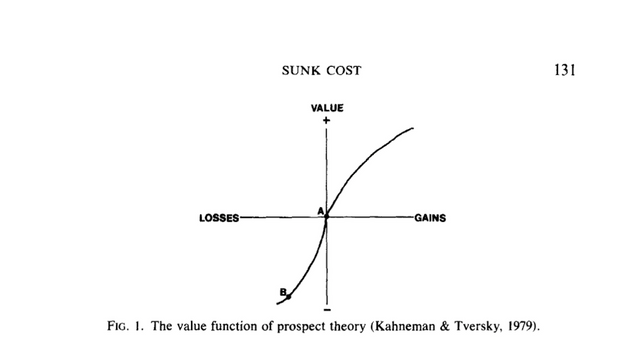
Introduction
Even if you have never heard of it you are likely familiar with what is known as the Sunk Cost Effect (SCE) or Sunk Cost Fallacy.
What is it?
According to Arkes and Blumer (1985) it is:
"a greater tendency to continue an endeavor once an investment in money, effort, or time has been made."
It is a form of bias based on past decisions that is based on an irrational economic view.
Common Examples

There are so many ways that the SCE can manifest in every day life that it is impossible to list every potential example.
Some common ones would be:
- Occupational -persisting in a job due to time/effort already invested.
- Relationships - persisting in a relationship due to previous time/emotional/financial investment.
- Investing - continuing to persist in a failing investment due to past money you have put in.
- Maintenance - spending more money on maintining an old car than a better quality used car would cost due the previous "sunk" cost.
A More Detailed Example - Aircraft Research Question

In their 1985 paper "The Psychology of Sunk Cost", Arkes and Blumer use a number of experimental examples where they gave participants various pairs of questions to answer.
Here is one pair:
Question 3A (in the paper)
As the president of an airline company, you have invested 10 million dollars of the company’s money into a research project. The purpose was to build a plane that would not be detected by conventional radar, in other words, a radar-blank plane. When the project is 90% completed, another firm begins marketing a plane that cannot be detected by radar. Also, it is apparent that their plane is much faster and far more economical than the plane your company is building. The question is: should you invest the last 10% of the research funds to finish your radar-blank plane?
Answers: Yes 41 No 7
Question 3B.
As president of an airline company, you have received a suggestion from one of your employees. The suggestion is to use the last 1 million dollars of your research funds to develop a plane that would not be detected by conventional radar, in other words, a radar-blank plane. However, another firm has just begun marketing a plane that cannot be detected by radar. Also, it is apparent that their plane is much faster and far more economical than the plane your company could build. The question is: should you invest the last million dollars of your research funds to build the radar-blank plane proposed by your employee?
Answers: Yes 10 No 50
In question 3A it would appear that people's willingness to invest is affected by the money they have already "sunk" into the research to develop the plane.
Even though the competitor and the chances of success of the plane are identical in both cases the "sunk" cost results in a decision that may otherwise be considered irrational.
N.B. In response to criticism that cost inequality between 3a and 3b might have affected outcomes, they redid the test with a modified version of 3b that had the same total (10 million dollars) cost for both planes.
The results were identical.
Theories For Why the SCE Occurs
Prospect Theory
This relates to the subjective value of losses and gains. An illustration of this is provided by the following diagram:

Someone with a "sunk" cost would start at point B, whereas a new investment would start at point A.
According to Arkes and Blumer:
"At point B further losses do not result in large decreases in value; however, comparable gains do result in large increases in value. Therefore an investor at point B in Fig. 1 will risk small losses in order to obtain possible large gains. "
It is therefore at least in part a function of subjective perception.
The Admission of Waste

This is put forward by Arkes and Blumer as equally important.
The reason people keep investing is because failure to do so would imply waste of the previous investment.
This is not only internally problematic for the subject but it may also invoke social stress if it relates to something that others may be aware of.
Waste is generally seen as being very negative in societal terms.
By continuing the investment the subject continues the prospect that the investment may eventually pay out (no matter how small that possibility is).
The previous money is therefore not wasted as it may still pay out in the long term - at least in the mind of the subject.
This can also be seen to bear some relation to cognitive dissonance theory in that a behaviour which may be considered maladaptive is continued in order to reduce potential dissonance.
Related Theories
Cognitive Dissonance (CD)

This article has a useful summary of CD:
a powerful motive to maintain cognitive consistency can give rise to irrational and sometimes maladaptive behavior.
As mentioned earlier this bears some similarities to SCE, however, according to Arkes and Blumer (in reference to CD research):
Numerous studies have shown that once a subject is induced to expend effort on an onerous task, the task is revalued upward
This does not really seem to apply to Sunk Cost Effects:
There are differences...in dissonance research subjects who have no sufficient justification for performing an onerous task improve their attitude toward the task. In the sunk cost situation, on the other hand, it is unlikely that investors begin to enjoy their floundering investments.
Some aspects of dissonance may apply but it is not really a complete fit or explanation.
Entrapment Theory

Subjects in entrapment situations typically incur small, continuous losses as they seek or wait for an eventual goal. Brockner et al. cite the example of waiting for a bus. After a very long wait, should you decide to take a cab, thereby nullifying all the time you have spent waiting for the bus?
This is similar to the SCE in that the time you have already waited could be seen as being "sunk".
Continued investment could be an analogue to small continuous losses.
There are differences too.
Continuing to wait is not as irrational from an economic standpoint as most sunk cost examples.
If you wait long enough a bus will eventually arrive.
If you keep investing in the plane from the earlier example there is no guarantee that it will be a success.
Foot in the Door (FITD)/Low Ball (LB) Techniques

These are both versions of an old sales technique.
Getting someone to comply with an initial small request increases the likelihood that they will comply with a larger request later:
An example would be first having people sign a petition to encourage legislators to support safe driving laws. Later, the petition signers are asked to display on their lawn a large sign that reads, “Drive safely.”
The Low Ball technique is similar:
When the small and large requests are for the Same target behavior, the technique is called the “low-ball” procedure (Cialdini, Cacioppo, Bassett, & Miller, 1978). An example would be getting someone to agree to buy a car at a discounted price and then removing the discount. The initial decision to buy heightens willingness to buy later when the car is no longer a good deal.
This bears some superficial relation to Sunk Cost.
An investment which would be less likely to be made on it's own becomes more likely in the face of a previous investment.
There are differences though as Arkes and Blumer point out:
A major difference between the sunk cost effect and the two techniques is that compliance is the dependent variable with the two techniques. Compliance typically plays no role in the sunk cost effect.
Put simply compliance is responding to a request from another person.
This is different from what occurs in the SCE, as in that case the person is responding to their own internal request and an outside agency does not come into it.
It is believed that FITD/LB work on the basis of "self-perception" theory:
A person observes himself or herself complying with a request to support good driving or a charitable organization. The person then concludes, “I’m the sort of person who supports that cause.” This conclusion based on self-observation then results in a high level of compliance when the larger request is made later (Snyder & Cunningham, 1975).
This is not really consistent with the SCE.
Using the plane analogy it is unlikely that you would continue to invest in developing the plane merely because you are "the kind of person who invests in developing planes".
Conclusion

I hope you have found this summary of the Sunk Cost Effect useful.
If you are familiar with investing or trading then it is likely you have encountered it in it's more obvious financial guises but it applies just as much to other domains.
Many of us may have found ourselves in relationships or jobs where we felt our prior investment of time or effort meant that we had to persist.
The type of investment is not important, merely that there is some kind of investment which affects our current or future decisions.
What examples have you encountered? Let me know in the comments.
References
- Arkes, Hal R., and Catherine Blumer. 1985/2. “The Psychology of Sunk Cost.” Organizational Behavior and Human Decision Processes 35 (1): 124–40.
- Thaler, Richard. 1980/3. “Toward a Positive Theory of Consumer Choice.” Journal of Economic Behavior & Organization 1 (1): 39–60.
- McLeod, Saul. 2017. “Cognitive Dissonance Theory | Simply Psychology.” Accessed January 19. http://www.simplypsychology.org/cognitive-dissonance.html.
Thank you for reading

Before you go have you filled in the Coinbase form to list STEEM? It only takes a few seconds. THIS POST shows you how.

Before you go have you filled in the Coinbase form to list STEEM? It only takes a few seconds. THIS POST shows you how.
If you like my work please follow me and check out my blog - @thecryptofiend
All uncredited photos are taken from my personal Thinkstock Photography account. More information can be provided on request.

Hello @thecryptofiend,
Congratulations! Your post has been chosen by the communities of SteemTrail as one of our top picks today.
Also, as a selection for being a top pick today, you have been awarded a TRAIL token for your participation on our innovative platform...STEEM.
Please visit SteemTrail to get instructions on how to claim your TRAIL token today.
If you wish to learn more about receiving additional TRAIL tokens and SteemTrail, stop by and chat with us.
Happy TRAIL!

Downvoting a post can decrease pending rewards and make it less visible. Common reasons:
Submit
Thank you:)
Downvoting a post can decrease pending rewards and make it less visible. Common reasons:
Submit
you did a wonderful piece equivalent to postgraduate doctorate degree presentation
Downvoting a post can decrease pending rewards and make it less visible. Common reasons:
Submit
You are too kind:)
Downvoting a post can decrease pending rewards and make it less visible. Common reasons:
Submit
Unfortunately our emotional decisions are never rational :-) I did a post about the sunk cost fallacy a while back, not nearly as in depth as this. Good post!
Downvoting a post can decrease pending rewards and make it less visible. Common reasons:
Submit
I actually have talked clients out of buying crappy houses based on emotional decisions clouding their judgement.
Downvoting a post can decrease pending rewards and make it less visible. Common reasons:
Submit
Yes, people that are buying their "home" get clouded by wants and desires over making a prudent purchase. It's a little easier when you are buying as an investment to think with your head and not your heart, but some still fall victim to it. I've seen it happen with people flipping houses and getting overzealous about the home's "potential"
Downvoting a post can decrease pending rewards and make it less visible. Common reasons:
Submit
well said for sure. One year I walked away from nearly $50k for not selling crap to people and they went and bought the house off another agent and regretted it later, for just these reasons.
Downvoting a post can decrease pending rewards and make it less visible. Common reasons:
Submit
Good for you for being a solid agent. I have worked with several agents and it amazes me at how uninformed so many can be. Gives a bad name for those doing good work. As an investor I do all the work on my end so I can ensure I don't get screwed. Literally use my agent for access to property and to write contracts, not much else.
Downvoting a post can decrease pending rewards and make it less visible. Common reasons:
Submit
Thank you. I suspect you have come across it in the housing market!
Downvoting a post can decrease pending rewards and make it less visible. Common reasons:
Submit
funny, I made a housing comment here and then saw your comment, I made as a Realtor looking out for clients.
Downvoting a post can decrease pending rewards and make it less visible. Common reasons:
Submit
I think there was a movie with Tom Hanks in the 90s called the "Money Pit" exactly about it!
Downvoting a post can decrease pending rewards and make it less visible. Common reasons:
Submit
Yep, there ya go lol.
Downvoting a post can decrease pending rewards and make it less visible. Common reasons:
Submit
Financially? Restructuring Distressed Assets in Greece is throwing good money after bad money, simply because you can' t afford writing the bad money off. Emotionally? Hmmm I better skip that part....
Downvoting a post can decrease pending rewards and make it less visible. Common reasons:
Submit
That is the thing and one of the reasons some researchers refuse to call it a "fallacy" and so the term "effect" is used instead. What may be irrational in a purely economic sense may be rational from an emotional sense if that is not an oxymoron!
We generally like to believe that we act rationally, however in many cases emotional reasoning overrides logical considerations.
Downvoting a post can decrease pending rewards and make it less visible. Common reasons:
Submit
Hi! I am a robot. I just upvoted you! I found similar content that readers might be interested in:
http://www.decisionsciencenews.com/2006/05/29/would-you-throw-good-money-after-bad/
Downvoting a post can decrease pending rewards and make it less visible. Common reasons:
Submit
Yes it quotes the same paper.
Downvoting a post can decrease pending rewards and make it less visible. Common reasons:
Submit
Good kitty! lol
Downvoting a post can decrease pending rewards and make it less visible. Common reasons:
Submit
Interesting! Markets are behavioural!
Downvoting a post can decrease pending rewards and make it less visible. Common reasons:
Submit
Thanks , yes - that is what fascinates me about economics in general - the human component - how all those individual minds fit together and create the market.
Downvoting a post can decrease pending rewards and make it less visible. Common reasons:
Submit
It's really easy to fall victim to the suck cost fallacy, we fall victim to it in lab frequently, where we keep throwing money at a sub par solution to a problem because we have spent so much time learning to use it, ignoring potential better solutions.
Downvoting a post can decrease pending rewards and make it less visible. Common reasons:
Submit
Exactly. I encountered this doing a microbiology experiment at University. I had spent several weeks on a particular experiment but there was a flaw in it's design which meant that the data had to be discarded - but it was really hard to do for just that reason!
Downvoting a post can decrease pending rewards and make it less visible. Common reasons:
Submit
I remember a job interview (I was interviewing the applicant) where I asked the candidate why he was applying to the job. The answer was because the state has already invested a lot money on him (by contributing to the cost of his studies) and not offering a job would be a waste of public money. Of course, here it was not holding as you could say the exact same thing for all the other applicants...
Downvoting a post can decrease pending rewards and make it less visible. Common reasons:
Submit
Lol that doesn't surprise me!
Downvoting a post can decrease pending rewards and make it less visible. Common reasons:
Submit
Yes we have all sunk capital (emotional, $ or labour) into things and we want to see it thru. I did not know that is what it was called.
It reminded me of our PM's on Crypto investing LOL!
I was pretty stoked to see you thread those other things in as relateds, I was very truth-based happy to see
Cognitive Dissonance
in there!
I wonder how many people this applies to - your title here -- when it comes to Steemit blogging?
Downvoting a post can decrease pending rewards and make it less visible. Common reasons:
Submit
Thanks:)
Downvoting a post can decrease pending rewards and make it less visible. Common reasons:
Submit
I hadn't heard of the name of this effect, but I definitely know it from my early days of poker before I learned to exercise patience.
I raise someone, they re-raise, and even though I am 100% sure they are not bluffing and have a better hand than me, I would call or re-raise just because I had already committed too much to the pot to abandon. I'd just hope to get lucky on the river or something..
I think this is exactly what you speak of in this post.
Downvoting a post can decrease pending rewards and make it less visible. Common reasons:
Submit
Yes it is I think:)
Downvoting a post can decrease pending rewards and make it less visible. Common reasons:
Submit
This may also explain why so many clearly failed coins still get mined and traded in low volume by people who refuse to believe they are never going to be the next Bitcoin.
Downvoting a post can decrease pending rewards and make it less visible. Common reasons:
Submit
It is the FOMO theory of investing -- Fear of Missing Out. You are right!
Downvoting a post can decrease pending rewards and make it less visible. Common reasons:
Submit
Yes I think you are right.
Downvoting a post can decrease pending rewards and make it less visible. Common reasons:
Submit
Wow an amazing post in so many ways -
I remember we did a little of this when I was as student at Uni but it was more to do with how an artist/illustrator/designer can spend days or weeks on a project and then suddenly realize that what you have come up with is rubbish.
With the deadline looming that do you do- carry on and make the rubbish look prettier or do you throw it all and start again?
It is bad if you are employed as a designer/illustrator, but it must be ten time this if you have your own personal money involved.
It all made sense, although I was lost with the chart thingy but only I am hopeless at understanding charts lol!
Fantastically presented! - I have a long way to go to get to this standard @thecryptofiend
Downvoting a post can decrease pending rewards and make it less visible. Common reasons:
Submit
Thank you so much. I'm glad you found it useful. The chart is not brilliant to be honest - I think some sort of animation would explain it better but I couldn't really find one. Thank you for taking the time to comment:)
Downvoting a post can decrease pending rewards and make it less visible. Common reasons:
Submit
You are the busiest poster lately @arthuradamson --- you are chasing down @thecryptofiend this week for top spot on post count I think LOL
Downvoting a post can decrease pending rewards and make it less visible. Common reasons:
Submit